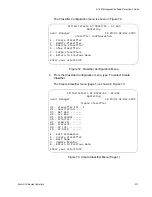
Chapter 11: Event Logs and the Syslog Client
206
Section II: Advanced Operations
Clearing an
Event Log
To clear all events from an event log, perform the following procedure:
1. From the Main Menu, type
5
to select System Administration.
2. From the System Administration menu, type
8
to select Event Log.
The Event Log menu is shown in Figure 63 on page 198.
3. From the Event Log menu, type
C
to select Clear Log.
The following prompt is displayed:
Enter output to clear (T=Temporary, P=Permanent) ->
4. To clear the temporary event log, type
T
. To clear the permanent event
log, type
P
.
Saving an Event
Log to a File
You can save an event log as a file in a file system to review later or to
upload to your management workstation. The file is saved as an ASCII file.
To save the event log as a file in the file system, perform the following
procedure:
1. From the Main Menu, type
5
to select System Administration.
2. From the System Administration menu, type
8
to select Event Log.
The Event Log menu is shown in Figure 63 on page 198.
3. Configure options 2 to 6 in the Event Log menu to specify which log
and entries you want saved to the file. For instructions, refer to
“Displaying an Event Log” on page 199.
4. From the Event Log menu, type
S
to select Save Log to File.
A confirmation prompt is displayed.
5. To save the log file, type
Y
for Yes or, to cancel the process, type
N
for
No.
If you type Y, the following prompt is displayed:
Enter file name (*.log) ->
6. Type a name for the file with a
.log
file name extension.
The following message is displayed:
Saving log to file.
Summary of Contents for AT-9400
Page 16: ...Figures 16 ...
Page 18: ...Tables 18 ...
Page 28: ...Preface 28 ...
Page 30: ...30 Section I Basic Operations ...
Page 60: ...Chapter 1 Basic Switch Parameters 60 Section I Basic Operations ...
Page 64: ...Chapter 2 Port Parameters 64 Section I Basic Operations Port Type The port type ...
Page 84: ...Chapter 2 Port Parameters 84 Section I Basic Operations ...
Page 124: ...Chapter 6 Static Port Trunks 124 Section I Basic Operations ...
Page 144: ...144 Section II Advanced Operations ...
Page 196: ...Chapter 10 File Downloads and Uploads 196 Section II Advanced Operations ...
Page 218: ...Chapter 11 Event Logs and the Syslog Client 218 Section II Advanced Operations ...
Page 242: ...Chapter 13 Access Control Lists 242 Section II Advanced Operations ...
Page 294: ...294 Section III IGMP Snooping MLD Snooping and RRP Snooping ...
Page 314: ...Chapter 19 MLD Snooping 314 Section III IGMP Snooping MLD Snooping and RRP Snooping ...
Page 318: ...318 Section IV SNMPv3 ...
Page 416: ...Chapter 21 SNMPv3 416 Section IV SNMPv3 ...
Page 418: ...418 Section V Spanning Tree Protocols ...
Page 470: ...470 Section VI Virtual LANs ...
Page 520: ...Chapter 26 Multiple VLAN Modes 520 Section VI Virtual LANs ...
Page 532: ...Chapter 27 Protected Ports VLANs 532 Section VI Virtual LANs ...
Page 546: ...546 Section VII Internet Protocol Routing ...
Page 560: ...560 Section VIII Port Security ...
Page 568: ...Chapter 30 MAC Address based Port Security 568 Section VIII Port Security ...
Page 586: ...Chapter 31 802 1x Port based Network Access Control 586 Section VIII Port Security ...
Page 588: ...588 Section IX Management Security ...
Page 610: ...Chapter 33 Encryption Keys 610 Section IX Management Security ...
Page 650: ...Chapter 36 TACACS and RADIUS Protocols 650 Section IX Management Security ...
Page 660: ...Chapter 37 Management Access Control List 660 Section IX Management Security ...
Page 668: ...Index 668 ...






























